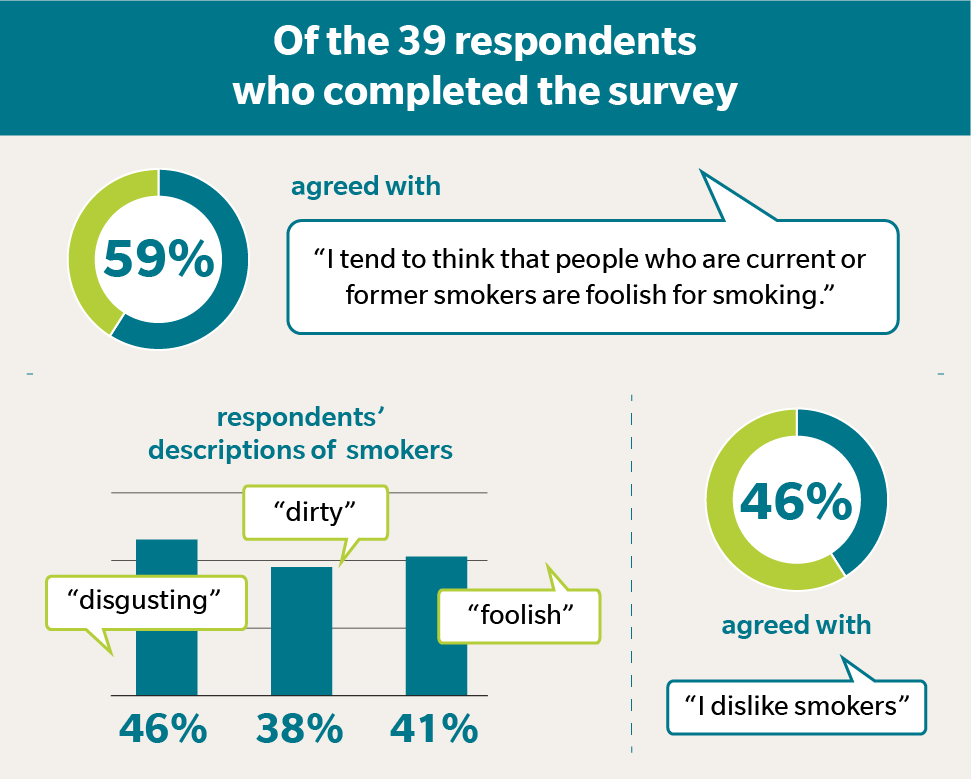Have you ever talked about a group of employees using these phrases:
- “I think [a group of people] are foolish.”
- “Some people who [engage in a behavior] may be smart, but most of them aren’t.”
- “I dislike [a group of people].”
Think these phrases are derogatory or judgmental?
It might surprise you to learn that many HR professionals endorse these statements—and others—about a particular group of people.
That group is people who smoke.
New research reveals that these attitudes can have real consequences for the support that is (or is not) made available to smokers to quit.
Stigma toward smokers among HR professionals
There are real consequences to this stigma, as outlined in our blog How to Reduce Mental Health Stigma, Smoking Stigma in the Workplace.
No one wants to think they discriminate against someone. But are there unspoken biases about tobacco users that may influence the work of HR professionals?
To address this question, we surveyed mid- to senior-level benefits professionals at companies with 500 or more employees in late 2022.
In addition to questions about their company’s wellness offerings, the survey asked respondents about their own alcohol use, sleep, physical activity, and tobacco use as well as their perceptions of tobacco use among other people.
Of the 39 respondents who completed the survey, many endorsed statements suggesting the presence of strong anti-smoker attitudes:
- 59% agreed with “I tend to think that people who are current or former smokers are foolish for smoking.”
- 46% of respondents described smokers as “disgusting”, 38% described them as “dirty”, and 41% described them as “foolish”.
- 41% agreed with “I dislike smokers.”
Surprisingly, roughly one in five (18%) respondents even agreed with the statement “Although some people who smoke must be intelligent, generally I think they tend not to be.”
Do personal health characteristics influence stigma?
Results from this survey also revealed that certain subgroups of respondents held stronger anti-smoking attitudes than others.
Those who were overweight or obese, compared to normal weight respondents, expressed stronger agreement with anti-smoking attitudes related to a lack of willpower among smokers. Examples of statements this subgroup agreed with include:
- “People who smoke have no willpower.”
- “People who smoke can quit if they tried.”
- “For people with smoking-related health problems, it is their own fault if they smoke or previously smoked.”
Similarly, former tobacco users expressed stronger anti-smoking attitudes overall compared to never tobacco users, endorsing statements such as:
- “If I were an employer, I might avoid hiring someone who is a current smoker.”
These findings suggest that the personal health of HR professionals may influence their perceptions and attitudes toward smokers.
How does stigma influence decisions about benefits?
Most survey respondents (73%) indicated that their company offered a tobacco cessation program and that they were at least somewhat involved in the decision to offer one as part of their benefits.
Interestingly, HR professionals who were very involved in decision making about a tobacco cessation program and whose company did not offer one to employees had scores that showed higher stigma.
Addressing biases to provide addiction support
As much as HR professionals are working to create a safe and inclusive work environment, they are not immune to influences of social norms around tobacco use.
The results from our survey confirm that many people, including HR professionals working in benefits, may hold anti-smoking stigma.
Fortunately, there are notable strategies that HR professionals and managers can use to remove this stigma of addiction. For 4 tips on how to effectively do this, please download our Tip Sheet for Managers: How to Reduce the Stigma of Addiction in the Workplace.
Still unsure how to implement essential steps to reduce stigma around tobacco addiction at work? With the EX Program, you gain an expert team that sets you up with best practices.
Visit our Employer page today to see how we support your company—and your employees—to be tobacco-free.






